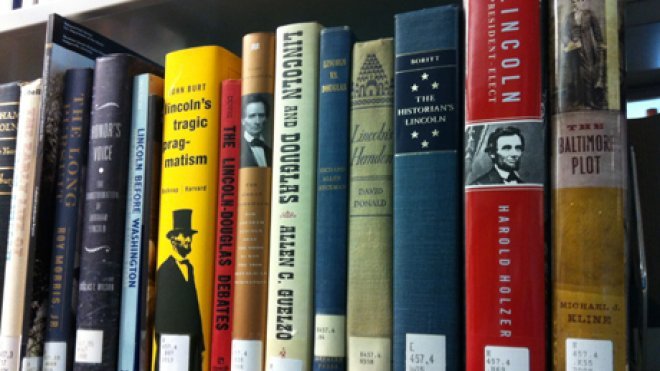Novelist Examines the Private Life of a Public Figure with Abraham Lincoln
Writer-in-residence Adam Braver revisits his inspiration and writing process for his 2009 novel, Mr. Lincoln’s Wars, as part of traveling Lincoln exhibition at RWU Library

BRISTOL, R.I. – A scene in a children’s novel describing President Abraham Lincoln taking off his shoes and exclaiming to his wife Mary about having “to let the dogs breathe” first captured Adam Braver’s imagination as a young boy – and stayed with him later in life as he ventured into a writing career. Braver, a professor of creative writing and the University Library’s writer-in-residence, recalls how Barbara Cary’s 1965 Meet Abraham Lincoln awakened a curious concept in him – one that he decided to explore in novels: thinking about legendary public figures in human terms.
This theme, which first inspired Braver to take on novel-writing with Mr. Lincoln’s Wars (2009), then percolated into a motif investigated in four more novels, he explained in a presentation in the “Talking in the Library” series that complemented a national traveling exhibition, Lincoln: The Constitution and the Civil War, on display at the library throughout October. The scene from Cary’s book also directly influenced the opening scenes of Mr. Lincoln’s Wars, Braver said, which depicts Lincoln sitting down with his shoes off “as a way to sort of pull him off-stage.”
For Braver, this thematic journey is rooted in the concept that “writers are constantly in conversations with themselves – refining their ideas and working them out as though they’ll find some sort of philosophical proof (to the meaning behind the human condition).” The conversation he’s been having with himself in his novels? What is private life to a public figure?
Taking up that idea via Lincoln was an easy decision – Braver has cultivated a long-time fascination with the abolitionist president, and now he was prepared to pore over the mystery of Lincoln’s private life. He explored the idea imaginatively and, “as many a historian has pointed out,” he noted, took liberties with the facts. With fiction, Braver said, there’s the world we live in and a different world between a book’s covers – and he was more interested in the latter.
In Mr. Lincoln’s Wars, Braver explained that he used Lincoln as a template to explore human existence: “The character of Lincoln was less interesting to me than the issues about consciousness and being human during that time.” For example, he found it compelling to examine how he imagined Lincoln dealt with a private tragedy, his son’s death, within the public sphere – all while handling a raging war.
Another element Braver aimed for was to make the story of Lincoln feel contemporary. “I didn’t want it to feel like a sepia-toned photograph of Lincoln nor did I want it to feel like it was a veiled way to teach history,” he said, adding that he made this a story about people, which meant having the license to go “off-the-record” at times.
In addition to discussing his writing process, Braver read selections from his novel, including "On to the Next Field," a chapter that features Lincoln on the battlefield. In that chapter, Lincoln holds a young soldier’s hand while a physician chops off the boy’s leg. When the soldier asks what it’s like to be president, Lincoln answers that "It's like fighting a thousand wars.”
An audience member noted that Lincoln, as a historical figure, is known as a man of great speeches and decisiveness, but the Lincoln in Braver’s book often seems at a loss for words. “Where did you find this man?” he asked Braver.
Braver explained that he was not endeavoring to re-write Lincoln as a new man, rather attempting to illustrate how Lincoln may have reacted as a person in difficult situations. Because his book was a mythical examination of a legendary man, Braver said he honed in less on what he knew of Lincoln’s actual actions and strove to create a sense of how anyone would feel in similar situations.
“I think emotions are universal,” he said. “I don’t think Lincoln grieved any differently than you would grieve or I would grieve.”